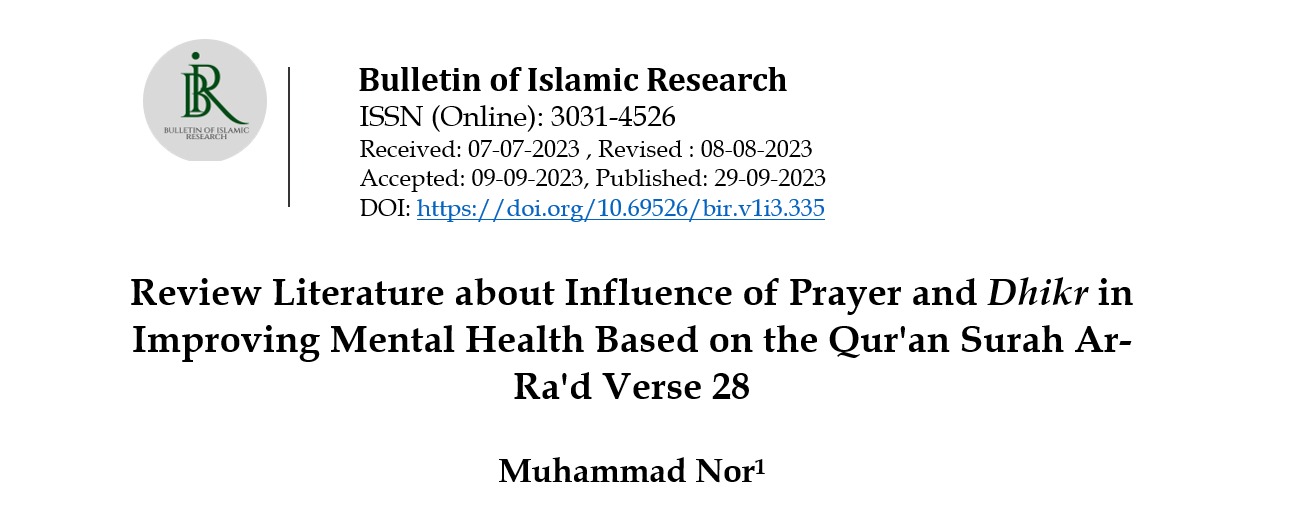Review Literature about Influence of Prayer and Dhikr in Improving Mental Health Based on the Qur'an Surah Ar-Ra'd Verse 28
DOI:
https://doi.org/10.69526/bir.v1i3.335Keywords:
Prayer, Dhikr, Mental Health, Al-Qur'an Ar'rad : 28.Abstract
This article discusses the influence of prayer and dhikr in improving mental health based on the Qur'an Surah Ar-Ra'd verse 28. This verse describes the peace that can be achieved by believers by remembering Allah. This study aims to explore how prayer and dhikr can be a tool to improve psychological well-being, reduce stress, and improve the emotional balance of individuals. The methods used in this study is studies Qualitative . The results of this study indicate that prayer and dhikr have a positive effect on reducing anxiety, depression, and increasing feelings of peace and satisfaction. It is recommended that individuals experiencing mental health problems can integrate prayer and dhikr into their daily lives as an easily accessible and effective form of therapy.
References
Wahab Syakhrani, A., & Rivaldi Yudistira, M. (2022). THE BASIS OF ISLAM AS A RELIGION OF RAHMATAN LILALAMIN. MUSHAF JOURNAL: Journal of the Science of the Quran and Hadith, 2 (3), 263–269. https://doi.org/10.54443/mushaf.v2i3.43
Daradjat, Z. (1983). The Role of Religion in Mental Health . PT Inti Idayu Press.
Mubarok, A. (2001). Qur'anic Psychology . Firdaus Library.
Yusuf, S. (2018). Mental Health: A Psychological and Religious Perspective . PT Remaja Rosdakarya.
Fuad, I. (2016). Maintaining Mental Health from the Perspective of the Qur'an and Hadith. Journal An-Nafs: Psychology Research Study, 1 (1), 31–50. https://doi.org/10.33367/psi.v1i1.245
SUMIKOLAH: JOURNAL OF EDUCATIONAL SCIENCES. (2023). Journal of Educational Sciences, 1 (2).
Saba, ZIZ (2024). The importance of employee mental health in the workplace on employee performance. JBK Journal of Guidance and Counseling, 2 (2), 38–45.
Lestari, WA, Sugiarso, BA, & Sompie, S. R. ( 2019). Interactive Mobile Learning Application for Daily Prayer Readings and Morning & Evening Dhikr. Journal of Informatics Engineering, 14 (1), 99–108.
QUTB, S., & et. all. (2004). Tafsir Fi Zhilalil Qur'an under the auspices of the Al-Quran. Gema Human Press.
Munjaji, AS (2024). Mental Health in the Perspective of Islamic Religion. Advances In Education Journal, 1 (3), 225–237.
Lutfiah, H., & Nahuda, N. (2024). Mental Health in the Perspective of PAI Critical Analysis of the Quran Surah Ar-Rad Verse 28. Journal of Education and Teaching Review (JRPP), 7 (3), 11071-11075.
Anni, D., & Nury, MY (2023). Peace of Heart from the Perspective of Tafsir Fi Dzilalil Quran (Mental Health Study in the Quran). Spiritual Healing: Journal of Sufism and Psychotherapy, 4 (1). https://doi.org/10.19109/sh.v4i1.15883
Nawawi, SC (2021). The Secret of Peace of Mind in the Qur'an. MAGHZA: Journal of Qur'anic Science and Interpretation, 6 (1), 30–46. https://doi.org/10.24090/maghza.v6i1.4476
Azizah, IN (2023). Benefits of Zikr in Calming the Soul. 1 .
Reza, W., Ananda, ST, Ivanca, T., Fadilah, A., & Jonathan, S. (tt). FACTORS INFLUENCING MENTAL HEALTH OF ADOLESCENTS IN BATAM CITY .
Kusuma, AB (2017). PSYCHOTHERAPY APPROACH OF THE QURAN IN MENTAL HEALTH DISORDERS (A Study of Religious Psychology). Al-Manar , 6 (1). https://doi.org/10.36668/jal.v6i1.22
Rajab, K. (2019). ISLAMIC PSYCHOTHERAPY . AMZAH.
Aini, S., & Santosa, B. (2023). The Influence of Dhikr on the Mental Health of Students at the Integrated MTs, Haji Abdul Karim Syu'aib Islamic Boarding School. Journal of Educational Management and Strategy, 2 (1), 11–20. https://doi.org/10.57255/jemast.v2i1.224
Shihab, M. Quraish,. (2013). Rules of Interpretation. Lantern of the Heart.
1804026161_Ra_Ainun Nahar_Full_Thesis—Ra ainun Nahar (1). (2022)
Dirgayunita, A. (2016). Depression: Characteristics, Causes and Treatment. Journal An-Nafs: Psychology Research Study, 1 (1), 1–14. https://doi.org/10.33367/psi.v1i1.235
Lubis, A. (tt). THE ROLE OF RELIGION IN MENTAL HEALTH
Ridha, AA (2024). Educational Values in QS Ar-Ra'ad Verse 28 and Its Relevance to Moral and Spiritual Education. Edudikara: Journal of Education and Learning , 9 (2), 65–70. https://doi.org/10.32585/edudikara.v9i2.363
https://doi.org/10.20885/tarbawi.vol10.iss2.art4
Yulia Ningsih & Rahmawati. (2022). The Impact of Prayer on Mental Health in Muslim Youth. Proceeding Conference On Da'wah and Communication Studies , 1 (1), 1–10. https://doi.org/10.61994/cdcs.v1i1.18
Rosyadah, D., Safitri, N. G., & Fauziah, S. (2024). PENGARUH PRAKTIK BERDOA TERHADAP KETENANGAN MENTAL. 2(2).
Rochmah, L., Abidin, C. Z., & Rohmad, M. A. (2021). RELASI ZIKIR TERHADAP KETENANGAN JIWA.

Downloads
Published
Issue
Section
License
Copyright (c) 2023 Muhammad Nor (Author)

This work is licensed under a Creative Commons Attribution 4.0 International License.



















